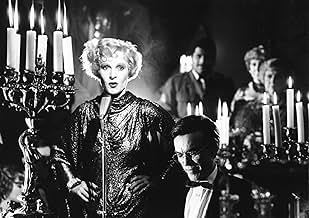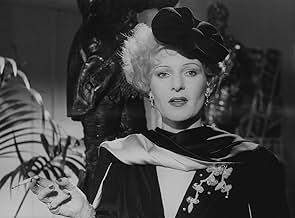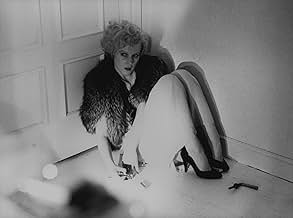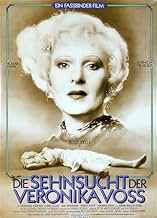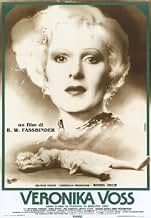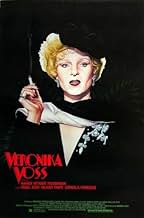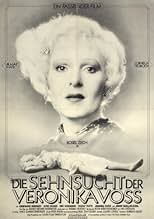VALUTAZIONE IMDb
7,6/10
8117
LA TUA VALUTAZIONE
Parzialmente basato sulla vita di Sybille Schmitz, che trovò fama sotto il regime nazista, ma la cui carriera fu poi distrutta.Parzialmente basato sulla vita di Sybille Schmitz, che trovò fama sotto il regime nazista, ma la cui carriera fu poi distrutta.Parzialmente basato sulla vita di Sybille Schmitz, che trovò fama sotto il regime nazista, ma la cui carriera fu poi distrutta.
- Regia
- Sceneggiatura
- Star
- Premi
- 4 vittorie e 4 candidature totali
Günther Kaufmann
- G.I.
- (as Günter Kaufmann)
- …
Recensioni in evidenza
In a career spanning a mere sixteen years, Rainer Werner Fassbinder made forty-four films before his death at just thirty-six, which occurred a few months after the premiere of this, the final part of what has come to be designated as his BRD Trilogy.
It is beautifully written by his regular collaborators Peter Marthesheimer and Pea Froelich, shot in knife-like black and white by his preferred cinematographer Xavier Schwarzenberger and as one would expect from this director, features a strong leading role for an actress, in this case Rosel Zech, whose character is loosely based upon that of the fascinating but tragic Sybille Schmitz who despite never being fully accepted by Herr Goebbels and company found it virtually impossible to continue her post-war career because of her perceived Nazi connections and whose drug-fuelled downward spiral ended in suicide in 1955.
Zech is simply stupendous in a demanding role that requires a wide range of emotions and as a bonus she performs a beguiling, Dietrich-like rendition of 'Memories are made of this." As a lesbian Dr. Feel-good, there is a magnificently chilling performance by Annemarie Dueringer. The entire cast is uniformly excellent and all of the characters are well drawn. Armin Mueller-Stahl again makes his presence felt whilst the influence of America in the Germany of the time is epitomised by the sound track and not least by the presence of the ubiquitous African-American GI played as always by Guenter Kaufmann. As well as being a tribute to the mighty UFA Studios, the relationship between fading star Voss and the journalist of Hilmar Thate is a nod to 'Sunset Boulevard'.
There is an absence of socio-political comment here and the whole enterprise succeeds solely through the myths of the movies. Fassbinder was an avowed devotee of the dream factory that was Hollywood and professed his adoration for Douglas Sirk. As it happened the master long outlived the pupil and Sirk offered a fitting tribute:"Although his fims were controversial.....only those things that survive opposition have the power of permanence."
It is beautifully written by his regular collaborators Peter Marthesheimer and Pea Froelich, shot in knife-like black and white by his preferred cinematographer Xavier Schwarzenberger and as one would expect from this director, features a strong leading role for an actress, in this case Rosel Zech, whose character is loosely based upon that of the fascinating but tragic Sybille Schmitz who despite never being fully accepted by Herr Goebbels and company found it virtually impossible to continue her post-war career because of her perceived Nazi connections and whose drug-fuelled downward spiral ended in suicide in 1955.
Zech is simply stupendous in a demanding role that requires a wide range of emotions and as a bonus she performs a beguiling, Dietrich-like rendition of 'Memories are made of this." As a lesbian Dr. Feel-good, there is a magnificently chilling performance by Annemarie Dueringer. The entire cast is uniformly excellent and all of the characters are well drawn. Armin Mueller-Stahl again makes his presence felt whilst the influence of America in the Germany of the time is epitomised by the sound track and not least by the presence of the ubiquitous African-American GI played as always by Guenter Kaufmann. As well as being a tribute to the mighty UFA Studios, the relationship between fading star Voss and the journalist of Hilmar Thate is a nod to 'Sunset Boulevard'.
There is an absence of socio-political comment here and the whole enterprise succeeds solely through the myths of the movies. Fassbinder was an avowed devotee of the dream factory that was Hollywood and professed his adoration for Douglas Sirk. As it happened the master long outlived the pupil and Sirk offered a fitting tribute:"Although his fims were controversial.....only those things that survive opposition have the power of permanence."
10hasosch
Rainer Werner Fassbinder's second-but-last film does not show primarily the life and downfall of the UFA-star Sybille Schmitz, but gives, at the hand of the Schmitz-inspired, yet fictive character Veronika Voss an unvarnished and hopeless picture of the Bundesrepublik Germany in the 50ies. Part of Fassbinder's "BRD-Trilogy", it is also one of his 4 "women"-films, besides "Lola", "Maria Braun", and "Lili Marleen".
It is hard to say if the main focus of this movie is the former UFA-star Veronika Voss or the sports reporter Robert Krohn. One rainy night, he meets, in a little forest amidst of Berlin, a crying little bundle of mensch who seems to have completely lost her orientation. She is not so much thankful for his help but astonished that he does not recognize her: the great Veronika Voss. After he accompanies the woman to her door, she continues to occupy his mind. He asks his older colleagues who confirm him that she was once a movies' super-star, but now forgotten, divorced, impoverished, addicted and out of work. Soon, they meet again, and between Krohn, who is in a steady liaison, and Veronika, who sees in him one of her once many admirers, a very problematic love story starts which costs two humans' lives, leaves an investigative mind back in despair, discloses the corruption between medicine and politics and portrays the deterrent situation in the post-war German film industry which used his former flagships as fuel.
R.W. Fassbinder got for this films the "Golden Bear" out of the hand of Jimmy Stewart who was his friend for many years. Fassbinder had been nominated for the highest German film price since a long time, but it was Stewart who realized that soon it might come too late. Fassbinder passed away only a few days after having received the Golden Bear.
It is hard to say if the main focus of this movie is the former UFA-star Veronika Voss or the sports reporter Robert Krohn. One rainy night, he meets, in a little forest amidst of Berlin, a crying little bundle of mensch who seems to have completely lost her orientation. She is not so much thankful for his help but astonished that he does not recognize her: the great Veronika Voss. After he accompanies the woman to her door, she continues to occupy his mind. He asks his older colleagues who confirm him that she was once a movies' super-star, but now forgotten, divorced, impoverished, addicted and out of work. Soon, they meet again, and between Krohn, who is in a steady liaison, and Veronika, who sees in him one of her once many admirers, a very problematic love story starts which costs two humans' lives, leaves an investigative mind back in despair, discloses the corruption between medicine and politics and portrays the deterrent situation in the post-war German film industry which used his former flagships as fuel.
R.W. Fassbinder got for this films the "Golden Bear" out of the hand of Jimmy Stewart who was his friend for many years. Fassbinder had been nominated for the highest German film price since a long time, but it was Stewart who realized that soon it might come too late. Fassbinder passed away only a few days after having received the Golden Bear.
Like many other Fassbinder films "Die Sehnsucht der Veronika Voss" tells about a decline and is very depressing. It is a visually stunning film that shows how much Fassbinder admired the classical Hollywood cinema and especially the films of Douglas Sirk. Like the films of his idol this film is stylish and artificial to an extreme extent which creates quite a distance between itself and the audience. Probably an even greater distance, since the style and the artificiality are used more consciously here, even as a instrument of alienation. So it is more fascinating than touching or even moving and might leave one even cold. Nevertheless the story is intriguing and it really tells something about the post war society in West Germany, so the film is interesting and even fascinating to watch. The scene where Rosel Zech as Veronika sings "Memories Are Made Of This" is very haunting, a gem.
In her own eyes,Veronika Voss is not really alive unless she retains her audience, unless she is loved and admired for her manufactured image. There are times in movies when Technicolor will not do, when the use of traditional black and white evokes evokes film noir, in this case referencing Billy Wilder's brilliant evisceration of and the pain of fading fame, Sunset Boulevard. The fine shadings of mood and atmosphere reflect the life led by Veronika under studio lights, just as the stark, unrelenting whites at her doctor's office blind her to reality during her visits for morphine injections.
Veronika Voss is based on the life of an actual German actress who rarely came alive unless under the lights, depicting a harsh and unrelenting life lived vicariously; it is a harsh look at a cruel existence increasingly dependent on addictive drugs to soften the hard knocks that come with the loss of fame and inability to face simultaneous aging process; it is a film worth repeated viewings.
Veronika Voss is based on the life of an actual German actress who rarely came alive unless under the lights, depicting a harsh and unrelenting life lived vicariously; it is a harsh look at a cruel existence increasingly dependent on addictive drugs to soften the hard knocks that come with the loss of fame and inability to face simultaneous aging process; it is a film worth repeated viewings.
A famous German actress, Veronika Voss (Rozel Zech) in her forties tries to revive her career while struggling with alcohol and drugs in the final chapter to Fassbinder's trilogy about collapse of the West German postwar dream. The film was inspired by the tragic life of famous UFA actress, Sybille Schmitz (1909-1955). She began her career in the films by the giants such Georg Wilhelm Pabst and Carl Theodor Dreyer and soon became one of Germany's beloved actress. Everything changed during the WWII and especially after its end.
Fassbinder's film which was shot in black and white visually is very impressive. "Light and shadows are two cinema's best secrets" says Veronika in the movie and light and shadows make the film a joy to behold. I like it but I think it is the weakest part of the trilogy perhaps because "Lola" and "Maria Braun" are so strong. I found the documentary about Sybille Schmitz, "Dances with Death" which is included on Criterion DVD much more compelling.
Veronika - 7/10 Dances with Death 8.5/10
Fassbinder's film which was shot in black and white visually is very impressive. "Light and shadows are two cinema's best secrets" says Veronika in the movie and light and shadows make the film a joy to behold. I like it but I think it is the weakest part of the trilogy perhaps because "Lola" and "Maria Braun" are so strong. I found the documentary about Sybille Schmitz, "Dances with Death" which is included on Criterion DVD much more compelling.
Veronika - 7/10 Dances with Death 8.5/10
Lo sapevi?
- QuizBased on the true story of German film star Sybille Schmitz.
- BlooperThe film is set in 1955 but the song "The Battle of New Orleans" by Johnny Horton, released in 1959, is heard on the radio a number of times.
- Citazioni
Dr. Marianne Katz: Artists are different from ordinary people. They are wrapped up in themselves, or simply forgetful.
I più visti
Accedi per valutare e creare un elenco di titoli salvati per ottenere consigli personalizzati
- How long is Veronika Voss?Powered by Alexa
Dettagli
- Data di uscita
- Paese di origine
- Lingue
- Celebre anche come
- BRD 2 - Die Sehnsucht der Veronika Voss
- Luoghi delle riprese
- Aziende produttrici
- Vedi altri crediti dell’azienda su IMDbPro
Botteghino
- Budget
- 2.600.000 DEM (previsto)
- Lordo Stati Uniti e Canada
- 8144 USD
- Fine settimana di apertura Stati Uniti e Canada
- 11.623 USD
- 16 feb 2003
- Lordo in tutto il mondo
- 8158 USD
- Tempo di esecuzione1 ora 44 minuti
- Colore
- Mix di suoni
- Proporzioni
- 1.66 : 1
Contribuisci a questa pagina
Suggerisci una modifica o aggiungi i contenuti mancanti

Divario superiore
By what name was Veronika Voss (1982) officially released in India in English?
Rispondi
